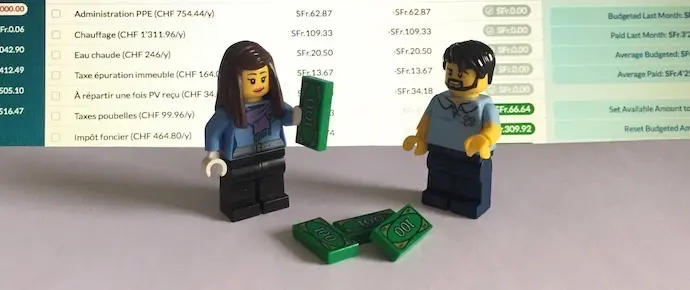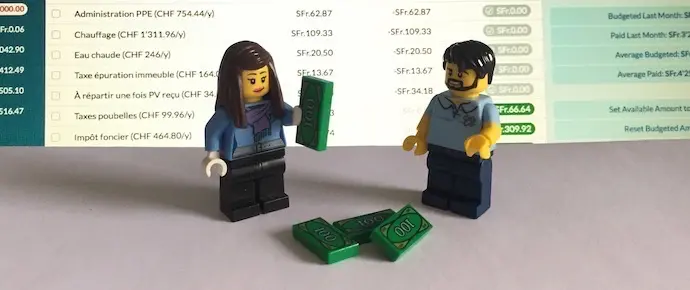Mrs MP and I met about a decade ago. At the time, each of us lived on his own with his own accounts, money and expenses.
I remember that we frequently played the game of who’d invite the other at the restaurant — although it was often Mrs MP who paid at the time because she already had a job while I was finishing my studies.
It was less effective in terms of a common financial vision, but it still had its charm.
This period lasted several years, but don’t take it as a standard or a rule to follow because it depends on where you’re with your life. Nevertheless, it’s a good thing to take the time to get to know each other in order to choose the right person to continue with the next steps in this serie. This in order to avoid setuping everything and then having to undo/redo it with someone else if you split up.
Moving in together, but keeping separate finances
Then came the time to move in together. We’d defined who’d paid what each month, keeping our accounts completely separated. So that there’d be no resentment or future criticisms, we’d taken care to share all of our expenses 50/50.
It was working pretty well. We never had any trouble making a payment on time, nor paying any bills. On that side, Mrs MP and I were aligned from the start: we hate to have debt or outstanding bills.
What sucked a little at times was the way we managed our remaining money. At regular intervals (every 3-6 months I’d say), Mrs MP found herself at the end of the month with a little overdraft. Nothing dramatic. The main and recurring reason was the lack of budgetary visibility — i.e. and not due to reckless or excessive spending. But still, we’d have been happy to do without such hassles.
On my side, I never had such “surprise” overdraft, for the simple reason that I didn’t have any income each month because I was still in school at that time in our lives. And the little I earned, I’d a strong tendency to save it.
Example of our expenses’ sharing at that time
To give you an idea, here is how the expenses were actually distributed:
- Mrs MP was paying for the groceries
- Mrs MP was paying for electricity and water for our apartment
- Mrs MP was paying for her car, gas, and insurance (I didn’t have one myself)
- I was paying the rent (well, that was actually my parents at the time!)
- I was paying for the apartment insurance
- I was paying the taxes related to the apartment
- Each of us paid for their outings
- Each of us paid for their clothes/footwear
Basically, we’d made sure that the “essential” expenses were shared equally, and for the rest it was everyone for himself.
The advantage of this system was that everything was clearly defined and calculated in advance. No resentment or excuse possible. No need for a common budget (i.e. I mean an Excel file or similar), because everyone received their expenses in their own name by mail.
On the downside, we’d no common financial vision because everyone did what they wanted with the rest of their money (which can be seen as a plus for couples who want to keep their “individual freedom” at all costs).
Another drawback of this system is that it implicitly makes you record who pays what for other non-essential and non-budgeted common expenses. A McDo-Movie night, for example, could lead to a discussion of “Who paid for the last time?”, followed by “Oh yes, it was you, but in the meantime I paid for the entrance to the water park…”
Although this kind of discussion was based on a good sense of fairness, it’d quickly turn sour again because of a lack of budgetary visibility. If only we’d had YNAB in our lives, it’d have closed many discussions very quickly.
However, I must admit, we had very few arguments related to the outings because I had almost no cash during that period, and my SO has a heart this big (the emotional comes before the rational with her, compared to me…), which made her take pleasure in inviting me much more often than I (could’n’t) did it.
If you’re under 20-25 years old
A quick aside for our young readers: thinking back to those days when we lived with very little, I regret not having come across Jacob’s book or my own blog, because I’d’ve won 7-8 years of savings, during which we spent a lot and raised our standard of living as wages increased. Turned more positively: if you who are reading these lines are in your twenties, don’t make the same mistake and join the FIch (Financial Independence in CH) movement as soon as possible 1!
Next step: pro rata and joint account
If we’d to summarize this first financial stage of our common life, we’d say: common household, shared expenses on equal terms, separate budgets, separate accounts, and some hassles due to lack of budgetary visibility.
Fast forward a few years later, when I got my first job after graduation.
Over the next two to three years, we gradually changed the way we divided our common expenses between pro rata and common account. This is what I’ll explain in the next episode of this serie.
If you’re in one of these phases now, or have already gone through it, I’d be interested to hear your feedback. And if you’re even more advanced than the MP couple, don’t hesitate to share your tips and tricks with us!
The easiest way for me to get deep into a new topic of this importance is to start with the first blogpost, and read up until now using the navigation links at the bottom of each article in order to not miss any financial optimization or investment idea. ↩︎






